The Change That Happens Later In Life
It's the natural order of things, but it doesn't make it less painful.

Her hand in mine.
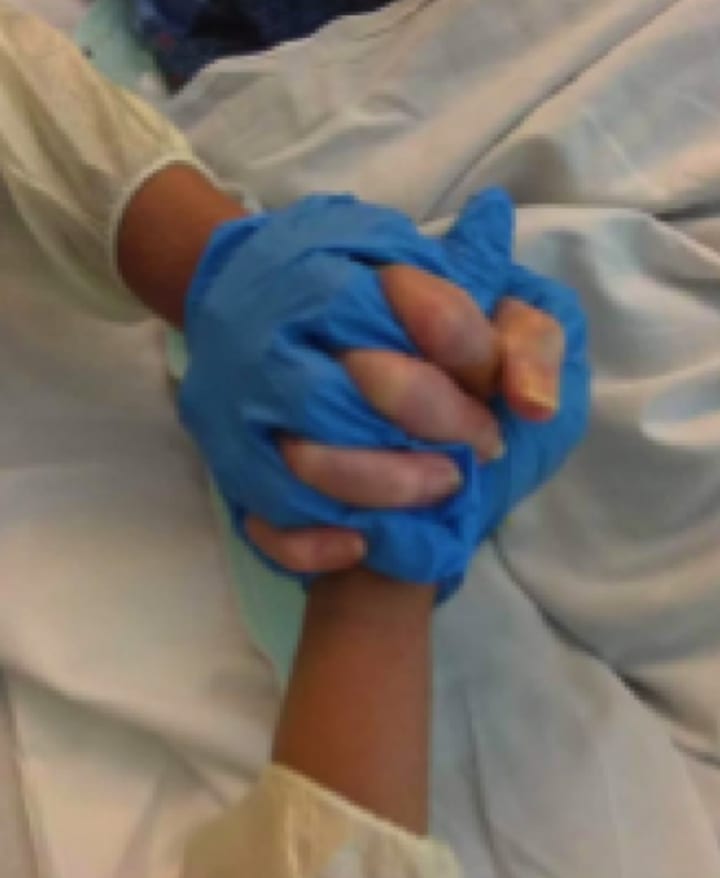
The six of us continued looking at the machine with the numbers, watching, waiting. Top number was the heart rate; below that were other numbers: blood pressure, oxygen saturation, and respiration. The glowing digits in the darkened room changed every moment as the tendrils of tubes measured the last bits of my mother’s life. An hour earlier, I had jokingly bet which number would reach zero first – respiration. I would be right.
This began in June of 2018 when she fell and broke her hip and was rushed to St. Joseph’s in Tampa. Surgery was agreed upon, and then she was transferred to Solaris Rehab in Hudson afterward, the best in the county, I was told. Shortly thereafter she was rushed to a different hospital, Bayonet Point, after developing a blood clot and contracting pneumonia. Once released from there, she was checked into another rehab, Life Care. It was emotionally and physically draining for everyone, going from place to place, producing cards, signing papers, and remembering names.
My right hand held her right hand, her skin soft, worn, warm enough to indicate she was still with us. Across from me sat my nieces; Christa, who had flown in from Utah the day before; Stephanie, who moved from Ohio to visit her Gramma more often, and Ashley, a local niece who was entering the medical field. Dalia, the niece named after my mother was there; although she had a strict curfew, that didn’t keep her away from a woman so important in their lives. Their eyes were red, and fruitless were their attempts to keep up their spirits as the woman in front of us was dying. All we could do is listen to the constant hum of the machines.
Christa said, “I just found out our grandfather is dying, too. It’s a double pain.”
Stephanie added, “I just moved down to see Gramma more, and now this.”
Dalia looked at her sisters and said, “We knew it would be a matter of time.”
All of them had fond memories of my parents and the house they’d lived in for 44 years. Most holidays were celebrated at that house, everything from Christmas to Labor Day. My mom would look at the calendar and call me, "It's Arbor Day this weekend. Are you coming over?" As my parents got older, we started bringing the food over so they wouldn’t have to do anything but play with grandchildren in the pool or out in the giant 2-acre property. After my dad died, we brought Gramma to our houses to celebrate so there would be no fuss on her part. She’d insist on bringing something, including her world-famous candied yams. Holidays were to be shared, even if it was just hot dogs and beans on Memorial Day.
“I’m going to miss her,” Dalia softly spoke. That sentiment lived in everyone’s mind.
I had just flown in that morning from Washington. Her recovery at Life Care was slow but still going and her health was improving, so I felt that the trip I’d planned almost a year ago to visit a friend would be ok. Mom was ok with it; Del and my Aunt Cookie would be able to visit. I was at a northeastern tribal art exhibit in Vancouver with my friend John when I got the call.
“Hello?” I answered.
“Is this Barb Dukeman?” a man’s voice asked.
“Yes.”
“I understand your mother has a DNR on file. Since you have power of attorney, I need you to execute the DNR.” This was the beginning of the end. I didn’t even know she had taken back to another ER. To be legal, the doctor must have me on record saying it out loud: do not resuscitate my mother. It was her wish not to be kept alive like this; we’d spoken about it many times before. I had to repeat it, there in front of the fur pelts and Inuit pottery, this time so the doctor could record it over the phone. I felt so out of place; I was among different ancestors.
“Yes. She did not want to be resuscitated.”
After that call I just broke down sobbing. I’m sure the other patrons of the museum were uncomfortable and wondered what was going on. I just gave the OK for my mom to die. John hugged me, and we both cried. “It’s gonna be ok. It’s gonna be ok,” he kept telling me. My mom always liked him. Said he was “good people.”
I packed quickly and caught the next red-eye flight across the US and arrived around 7 in the morning. My son David drove me home so I could take a quick shower; we headed back to the hospital, the third one in less than two months. Not that it mattered to her. She had another contagious infection, C-Diff, along with low blood pressure, which brought her to the final hospital. Her body was too weak to fight the multiple infections.
“Are you OK?” David asked.
I didn’t know how to respond. In my mind, I said no, I’m not OK. My mother is about to die. The one who gave me life as I did for you. “I’m ok,” was what I said. You might have to do this for me one day.
The machines kept humming along, and a nurse’s aide came in to adjust the IVs and medicines as needed. The nurse practitioner asked me about her religion. I smiled and started in with the story of how the Catholic Church rejected her because she married a non-Catholic a few months before the Vatican changed the rules about mixed marriages. A Justice of the Peace joined my parents in matrimony, quite the scandal in an Italian family. As I was blathering on, Stephanie bluntly told me, “I think she means for last rites, Aunt Barbara.”
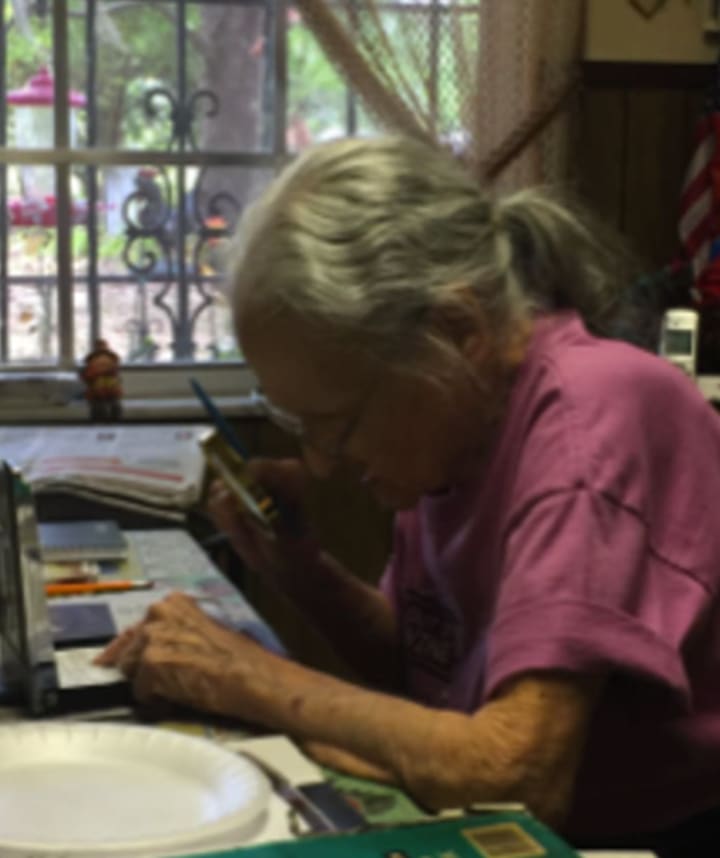
I lifted my head up. This thought had not crossed my mind. The DNR was surely just a precautionary measure. My mom would come back from this – she would still be sitting at her table Saturday mornings in no time, going through the mail, clipping coupons, and cutting articles and comics for my brother Del and me. I’d replace the water filter in her fridge, or change a light bulb that had gone out. She’d ask me to feed the cranes, the crows, and refill the hummingbird feeder. Taking care of her animals was very important to her, providing comfort and company. I politely declined religious intervention.
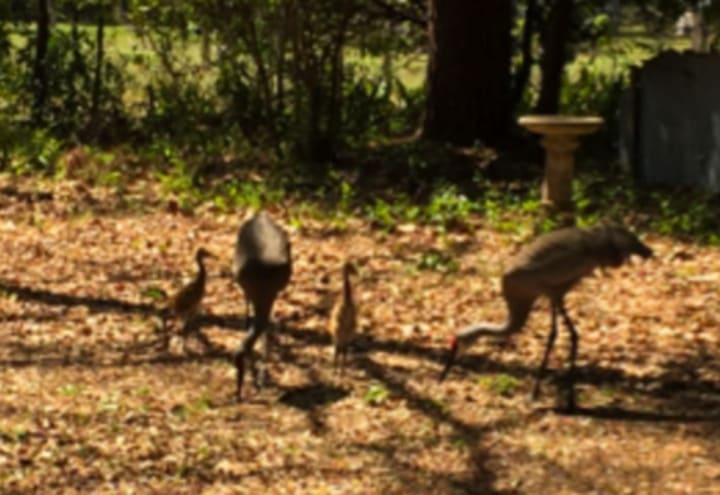
At Trinity Medical Center, she vacillated between vague lucidity and sleep. Legally blind, she would panic and call my name out over and over, even though I was right there holding her hand and trying to reassure her I was there. When I mentioned my sister-in-law’s name, Mary, she started repeating that over and over. In another panic, she called out for my dad once, calling him by his nickname, Yoyo. When she called for her mother, I knew things were getting worse. She didn’t get along well with her mother from some ancient bygone, but she was a dutiful daughter and took care of her each week just I did for my mother. My grandmother died 19 years earlier. Was she seeing them, or was her memory simply pulling up the past?
I tried to find something in the room to comfort her. She was in an isolation ward designed for contagious hospice patients, and we had to gown up and wear gloves every time we came in. No feeding tube, no ice chips, nothing I could do. Helpless to ease her physical discomfort, I took my phone and pulled up a playlist called Classical Mexican Mariachi.
I put my phone inside a disposable glove and set it on the bed beside her head. I pressed Play. Her lips moved as she tried to sing along. Familiar with the words, she wanted to sing along with some of her favorite singers, especially Jorge Negrete. Lost in the music, she calmed down.
“Si muero lejos de ti que digan que estoy dormido
y que me traigan aquí Que digan que estoy dormido
y que me traigan aquí”
This loosely translates to:
“If I die far from you say they are asleep
and bring me here
Let them say that I am asleep and bring me here.”
Her smile, mysterious in its reverie, gave an enigmatic feeling to the moment.
It was then I was asked about the IV meds and all the other care-should it continue? Because I had already enacted the DNR, I knew it was time even though I didn’t want to admit it. “I’d like her to have the pain medicine and oxygen. I don’t think...” I closed my eyes and shook my head. The attending nurse nodded and lowered the lights in the room, remaining by the door, a silent witness who had seen this happen many times before. My husband and oldest son stayed in background, allowing me to do what we knew would come next.
A few hours into the night I started a long story about our trips to the grocery store, recalling her routine in that store I helped her repeat every Saturday. It was one of the things she enjoyed doing – a huntress in the savannah of Publix. My voice, quiet as I narrated, matched the cold atmosphere of the room. I described her insistence that we go to the Dollar Store so she could buy her "bird food"; bread she cut up in little croutons to feed the cranes. Last stop was always the Natural Market. She enjoyed looking at the brightly-colored orchids outside the store. She complained about the prices of the vegetables, but she looked for whatever was in the clearance bin. A loaf of Cuban bread usually made it home with us; Cuban bread, sliced in half, smothered in Fleischmann’s margarine and eaten with black Maxwell house coffee. Our Saturdays, so familiar to her, were now being described for the last time. Tears cascaded down my nieces’ faces as my voice continued.
As the bright numbers on the vital signs monitor became lower, I told her, my words on the edge of a deep precipice, “Mom, it’s OK to go. You’ll be OK. It’ll be all right.” My nieces continued crying and stepped back from the bed, unable to witness the winnowing of her soul. I held my mother’s hand and watched the numbers zero out. My eyes became blurry. I was holding the hand of a dead woman, the woman who gave me life.
Looking down at my hand holding hers, my tears started, unbidden, and an unearthly sound came from my throat. This cry enveloped me and squeezed my chest; I couldn’t catch my breath.
My husband hugged me. “It’ll be ok. You were here. She’s at peace now.” I was lost; my guide, my best friend, mother, was gone.
About the Creator
Barb Dukeman
After 32 years of teaching high school English, I've started writing again and loving every minute of it. I enjoy bringing ideas to life and the concept of leaving behind a legacy.




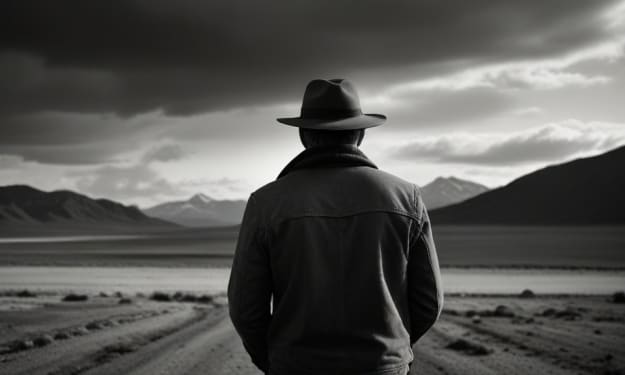
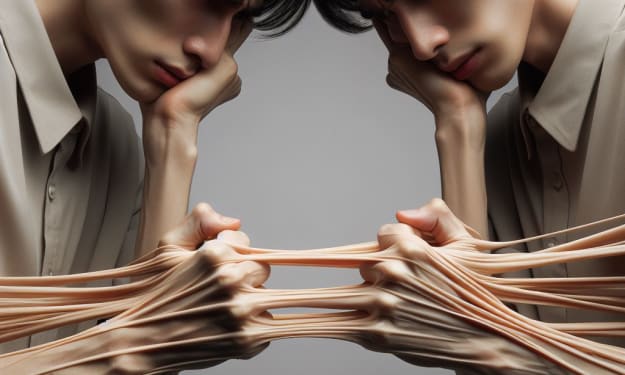
Comments
There are no comments for this story
Be the first to respond and start the conversation.